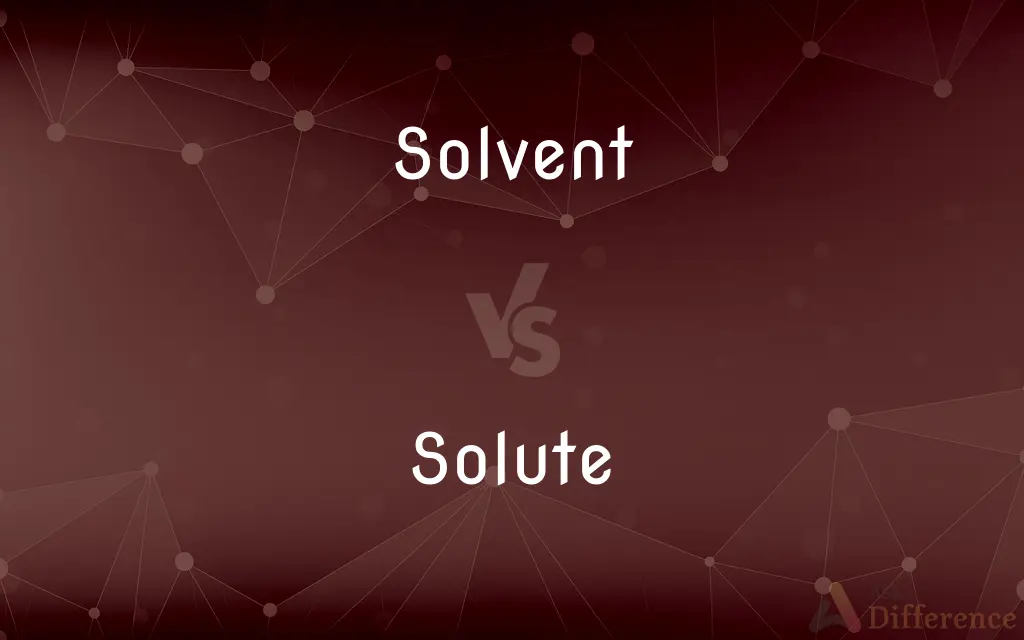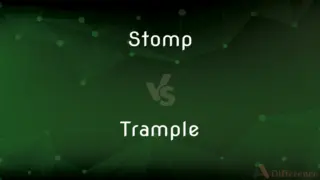Solvent vs. Solute — What's the Difference?
By Fiza Rafique & Maham Liaqat — Updated on April 15, 2024
Solvents dissolve solutes to form solutions; solvents are typically liquids like water, while solutes, like salt, are substances dissolved.

Difference Between Solvent and Solute
Table of Contents
ADVERTISEMENT
Key Differences
Solvents are substances that dissolve other substances, thereby forming a solution. The most common example of a solvent is water. On the other hand, solutes are the substances that are dissolved in solvents. An example of a solute is salt in saltwater.
The role of the solvent in a solution is typically to act as the medium in which the solute is dispersed. Water, as a universal solvent, can dissolve many substances due to its chemical properties. Whereas solutes like sugar or salt change their state, breaking into ions or molecules in the presence of a solvent.
In terms of quantity in a solution, the solvent is generally present in a larger amount compared to the solute. This allows the solvent to effectively surround and interact with solute particles. On the other hand, the solute is present in a smaller proportion, contributing to the overall characteristics of the solution, such as taste or conductivity.
Physical properties of solutions, such as boiling point and freezing point, are often determined by the nature of the solvent. For example, adding salt to water (the solvent) lowers its freezing point. Conversely, the solute's nature and quantity can significantly alter these properties, demonstrating their interdependence.
The solvent and solute interaction is crucial for the solubility of a substance. Solvents like ethanol are effective at dissolving nonpolar substances due to their chemical structure, while solutes with specific polarities find suitable solvents that maximize solubility.
ADVERTISEMENT
Comparison Chart
Definition
Substance that dissolves the solute
Substance that is dissolved
Common Types
Water, ethanol, acetone
Salt, sugar, carbon dioxide
Role
Medium for dissolving
Provides the substance being dissolved
Quantity
Larger quantity in solutions
Smaller quantity in solutions
Impact
Determines solution's boiling/freezing points
Alters physical properties of the solution
Compare with Definitions
Solvent
A substance that can hold solutes in solution.
Acetone is a solvent for plastic.
Solute
Often a solid but can be a gas or liquid.
Carbon dioxide is a solute in carbonated beverages.
Solvent
Can alter the physical state of solutes.
Alcohol as a solvent turns solid vanilla extract into a liquid solution.
Solute
Changes phase when dissolved.
Solid iodine becomes a solution when dissolved in alcohol.
Solvent
The major component in any solution.
In saline, water is the solvent.
Solute
Determines the chemical properties of solutions.
Electrolytes are solutes that conduct electricity.
Solvent
A liquid that dissolves a solid, liquid, or gaseous solute.
Water is a solvent for sugar.
Solute
A substance dissolved in another substance.
Salt is a solute when dissolved in water.
Solvent
Often organic in nature.
Benzene is a solvent used in industry.
Solute
Minor component in a solution.
In a sugar solution, sugar is the solute.
Solvent
A solvent (from the Latin solvō, "loosen, untie, solve") is a substance that dissolves a solute, resulting in a solution. A solvent is usually a liquid but can also be a solid, a gas, or a supercritical fluid.
Solute
A substance dissolved in another substance, usually the component of a solution present in the lesser amount.
Solvent
Capable of meeting financial obligations.
Solute
Being in solution; dissolved.
Solvent
(Chemistry) Capable of dissolving another substance.
Solute
Free; liberal; loose.
A solute interpretation
Solvent
A substance in which another substance is dissolved, forming a solution.
Solute
Relaxed; hence, cheerful, merry.
Solvent
A substance, usually a liquid, capable of dissolving another substance.
Solute
Able to be dissolved; soluble.
A solute salt
Solvent
Something that solves or explains.
Solute
(botany) Not adhering; loose.
A solute stipule
Solvent
A fluid that dissolves a solid, liquid, or gaseous solute, resulting in a solution.
Solute
Any substance that is dissolved in a liquid solvent to create a solution
Solvent
That which resolves.
Solute
(obsolete) To dissolve.
Solvent
(finance) Able to pay all debts as they become due, and having no more liabilities than assets.
Solute
(obsolete) To solve; to expose the errors of; to explain
To solute sin
Solvent
Having the power of dissolving; causing solution.
Solute
(obsolete) salute
Solvent
Having the power of dissolving; dissolving; as, a solvent fluid.
Solute
Loose; free; liberal; as, a solute interpretation.
Solvent
Able or sufficient to pay all just debts; as, a solvent merchant; the estate is solvent.
Solute
Relaxed; hence; merry; cheerful.
A brow solute, and ever-laughing eye.
Solvent
A substance (usually liquid) suitable for, or employed in, solution, or in dissolving something; as, water is the appropriate solvent of most salts, alcohol of resins, ether of fats, and mercury or acids of metals, etc.
Solute
Soluble; as, a solute salt.
Solvent
That which resolves; as, a solvent of mystery.
Solute
Not adhering; loose; - opposed to adnate; as, a solute stipule.
Solvent
A liquid substance capable of dissolving other substances;
The solvent does not change its state in forming a solution
Solute
To dissolve; to resolve.
Solvent
A statement that solves a problem or explains how to solve the problem;
They were trying to find a peaceful solution
The answers were in the back of the book
He computed the result to four decimal places
Solute
To absolve; as, to solute sin.
Solvent
Capable of meeting financial obligations
Solute
The dissolved substance in a solution; the component of a solution that changes its state
Common Curiosities
Why is water called the universal solvent?
Water is called the universal solvent because it can dissolve more substances than any other liquid.
Can a solute be a gas?
Yes, gases like carbon dioxide can be solutes when dissolved in liquids like water.
What is a solvent?
A solvent is a substance that dissolves a solute, forming a solution.
How does temperature affect solubility?
Generally, increasing the temperature increases the solubility of solids and liquids but decreases the solubility of gases.
Does the amount of solute change the boiling point of the solvent?
Yes, adding a solute to a solvent generally raises its boiling point and lowers its freezing point.
What is a nonpolar solvent?
Non-polar solvents are solvents that are composed of atoms that have little contrast in electronegativity.
Are solvents always liquids?
While most common solvents are liquids, gases and solids can also act as solvents.
What is a solute?
A solute is a substance that is dissolved in a solvent.
What is meant by solubility?
Solubility refers to the ability of a solute to dissolve in a solvent at a specific temperature and pressure.
What role does polarity play in solubility?
Polarity determines the types of solvents that can dissolve a given solute; like dissolves like.
Share Your Discovery

Previous Comparison
Stomp vs. Trample
Next Comparison
Geek vs. AnorakAuthor Spotlight
Written by
Fiza RafiqueFiza Rafique is a skilled content writer at AskDifference.com, where she meticulously refines and enhances written pieces. Drawing from her vast editorial expertise, Fiza ensures clarity, accuracy, and precision in every article. Passionate about language, she continually seeks to elevate the quality of content for readers worldwide.
Co-written by
Maham Liaqat














































